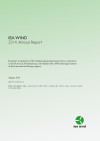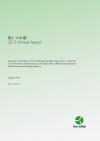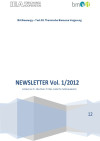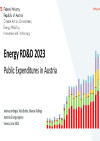Suchergebnisse für "Factsheet: Energietechnologien gestalten, die für alle sinnvoll und nutzbar sind"
EMA - Environmental Management Accounting - Pilot-testing
Training kit for environmental management accounting and investment appraisal
DigitalFindetStadt - Platform for digital innovations in the building sector
"Digital Findet Stadt" strengthens the digital innovation power of the Austrian building sector and thus contributes to a significant increase in resource, energy and cost efficiency.
PVReValue – Holistic recycling of photovoltaic modules
The PVReValue research project is pursuing a new approach to the holistic recycling of photovoltaic modules, based on an innovative multi-stage composite separation process that is being developed in the course of the project. The multi-stage separation process and the novel combination of modern treatment processes are expected to achieve a recycling rate of more than 95 wt.-%.
Evaluation of the planning and building processes of multi-storey wooden construction residential and office buildings, and the development of measures to optimise these processes.

An analysis of the building and planning processes of multi-storey wooden construction residential and office buildings, taking into consideration the opinions of the professionals involved (planners, building contractors, building executives), then the development, documentation and distribution of ways to optimise these processes, using "Info-Tool" software.
Workshop: Low Tech - High Effect!
25. Februar 2016
IG Architektur, Gumpendorfer Straße 63 B1060 Wien, AT
Im Rahmen dieses ExpertInnenworkshops werden nachhaltige Bauweisen unter den Aspekt der Anwendung von Low Tech Lösungen diskutiert.
Developing and implementing product-service-systems in the IT-sector
Developing and implementing product-service-systems in the IT-sector. Bringing the idea of sustainable IT-solutions for enterprises towards marketable models.
Documentation, comparison and processing of demonstration results on the topic of "Digital Building Twin"
The aim of the project was to compare results from two demonstration projects of a digital building twin and to document initial operational experiences.
Poly2Facade - Innovative thermal self-regulating solar facades by means of functional polymers
The overall objective of the present project is to develop and implement an optimal overheating protection system based on polymeric materials. The aim is to reduce maximum room temperatures in buildings caused by facade integrated solar-thermal collectors in stagnation.
Factors which hinder and support the market introduction of innovative residential building concepts - an information offensive for planners and technology producers.

In order to actively increase the diffusion of innovative residential buildings, the results of currently available research were summarised to produce a "'diffusion campaign", directed at building planners, residential building contractors and selected technology producers.
Ecobuilding - Building Optimisation with Total Quality (TQ) Assessment

The construction, use, and disposal of buildings cause expenses, material flows, energy consumption, and emissions. With intelligent design, construction, management, and marketing, it is possible to reduce environmental burdens and costs, improve building quality, and increase building value.
IEA Wind - Annual Report 2014

Herausgeber: PWT Communications, LLC für IEA Wind Energy Systems
Englisch, 200 Seiten
Downloads zur Publikation
IEA Wind - Annual Report 2013

Herausgeber: PWT Communications, LLC für IEA Wind Energy Systems
Englisch, 180 Seiten
Downloads zur Publikation
IEA Bioenergy Task 33: Newsletter Vol. 1/2012

Thermische Biomasse Vergasung
Dr. Jitka Hrbek, TU Wien, Institut für Verfahrenstechnik
Deutsch, 3 Seiten
Downloads zur Publikation
IEA District Heating and Cooling (DHC TCP)
The TCP on District Heating and Cooling (DHC) was founded in 1983. It deals with the design, performance and operation of DHC and Combined Heat and Power systems as powerful tools for energy conservation and the reduction of environmental impacts of supplying heat.
Mission Innovation Austria Online Event: Energy Communities - Findings from Innovation Programs and Pilots
23. April 2020
Online
The aim of the half-day webinar was to provide insights into energy communities and their opportunities and challenges arising from current market and regulatory regimes. More than 300 participants from 28 countries took part in the webinar.
BIMaterial Process Design for Material Building Pass
Building Information Modelling supported compilation of a Material Building Pass; as a qualitative and quantitative documentation of the material composition of, and the material distribution within, a building structure. This project is a central milestone towards standardized, BIM-generated building material passes.
Kongress: Kluge Strategien im Passivhausbau
10. Jun 2003 -
11. Jun 2003
A-3922 Großschönau, SchönauerhofGroßschönau, AT
FVV Großschönau veranstaltet diesen Fachkongress im Vorfeld der 18. BIOEM
Energy R&D 2023: Public Expenditures in Austria

Public spending on energy research totalled 310.8 million euros in 2023. The figure for 2021, by far the highest ever recorded in Austria, was therefore exceeded.
Schriftenreihe
16/2024
A. Indinger, F. Bettin, M. Rollings
Herausgeber: BMK
Deutsch, 150 Seiten
Downloads zur Publikation
IEA SHC Task 58/ECES Annex 33: Material and Component Development for Thermal Energy Storage
This Task/Annex addresses second generation materials for PCM and TCM energy storage and includes material development, characterization and testing under application conditions. In addition, the focus was on the interaction between material and storage component and on the expected storage performance of innovative materials.
SynENERGY - Energy optimised settlement development by making use of synergies of energy efficiency, spatial planning and building culture
SynENERGY aims at an innovative, holistic approach to urban district optimization. The project targets a comprehensive analysis of the framework and urban development concept which includes not only optimisation of sustainable energy supply and use but also increased material flows (construction and disposal) at urban district level.
